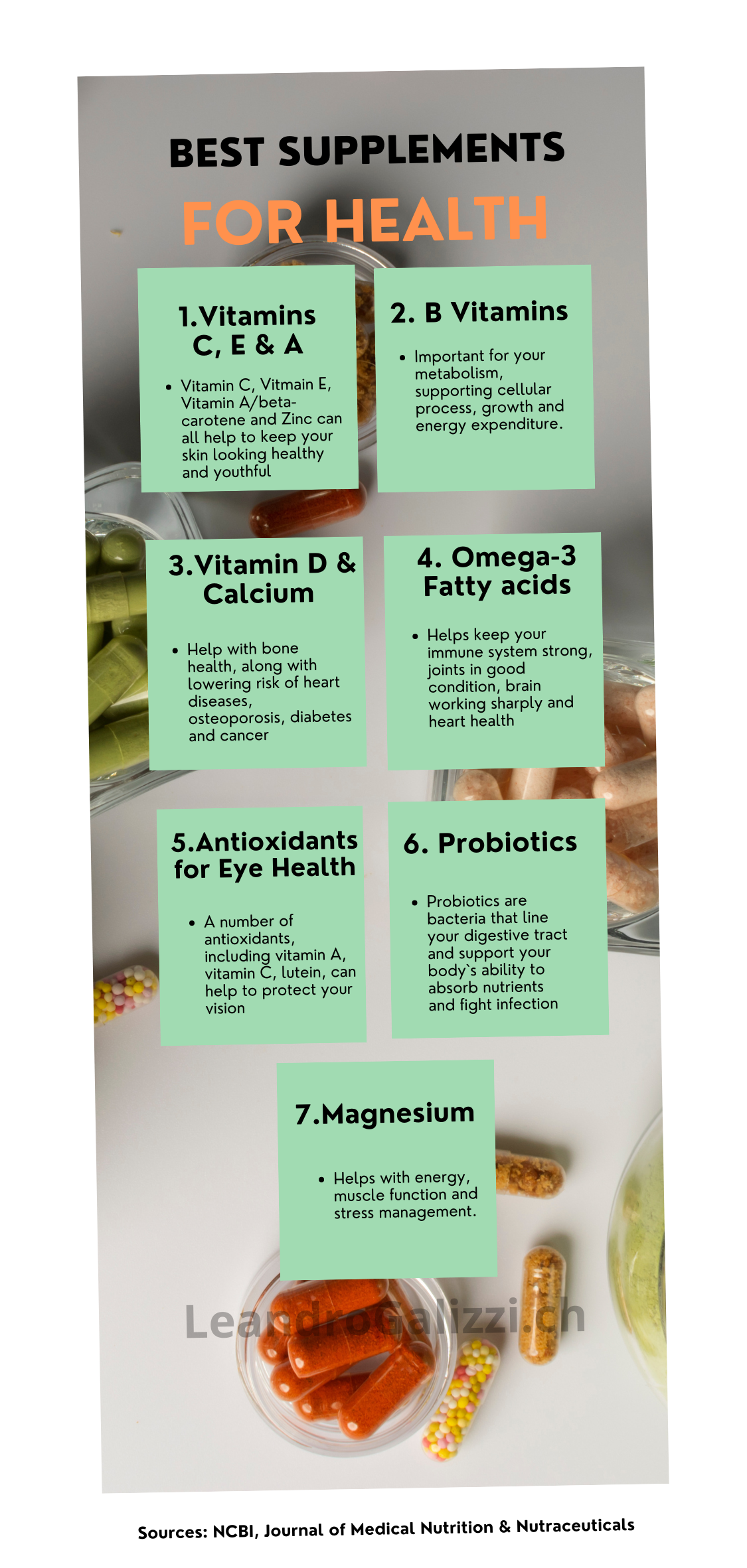Best Supplements for Overall Health: Top Picks and Dosage Tips

- 2. Why Supplements Matter
- 3. Top Supplements for Overall Health
- 4. How to Choose the Right Supplements
- 5. Practical Tips for Incorporating Supplements
- 6. Conclusion
1. Introduction
In recent years, there has been a significant surge in the interest surrounding dietary supplements. As more individuals strive to enhance their health and well-being, the market for supplements has expanded, offering a myriad of options tailored to various health needs. Choosing the right supplements is crucial for achieving optimal health benefits, as the quality and efficacy of these products can vary widely.
This blog post aims to guide expatriate women in Switzerland through the process of selecting the best supplements for overall health. Whether you’re navigating a new diet, coping with the stress of relocation, or aiming to fill nutritional gaps, understanding which supplements can support your health journey is essential.
2. Why Supplements Matter
Modern diets often fall short in providing all the essential nutrients our bodies need. Factors such as busy lifestyles, dietary restrictions, and limited access to a variety of foods can contribute to nutrient deficiencies. Supplements bridge these gaps, ensuring that individuals receive adequate levels of vital vitamins and minerals necessary for maintaining good health.
Age also plays a significant role in nutritional needs. As we grow older, our bodies require different nutrients to support functions like bone health, immune support, and energy production. Additionally, lifestyle choices, such as high-stress levels or intense physical activity, can increase the body’s demand for certain nutrients, making supplementation beneficial.
While obtaining nutrients from whole foods is ideal, it is not always feasible for everyone. Food sources alone may not suffice due to factors like soil depletion affecting nutrient content in vegetables or personal dietary restrictions limiting intake. Therefore, supplements serve as a practical solution to ensure comprehensive nutritional support.
3. Top Supplements for Overall Health
Multivitamins
Multivitamins are often considered the cornerstone of a good supplement regimen. They provide a broad spectrum of essential vitamins and minerals that may be lacking in your daily diet. Common deficiencies, such as those in vitamins D, B12, and iron, can be effectively addressed with a well-balanced multivitamin.
In Switzerland, especially during the winter months, many people may struggle to get enough sunlight, leading to lower vitamin D levels. A multivitamin can help fill this gap, ensuring that you receive a sufficient amount of this crucial nutrient, along with others like vitamin C, zinc, and magnesium, which are vital for immune health and overall well-being.
Omega-3 Fatty Acids (Fish Oil)
Omega-3 fatty acids, primarily found in fish oil, are essential for heart health, reducing inflammation, and supporting brain function. These fatty acids are not naturally produced by the body, making dietary intake or supplementation necessary.
Research has shown that omega-3s can help lower triglyceride levels, reduce the risk of heart disease, and improve symptoms of depression. For those who do not consume enough fatty fish, such as salmon or mackerel, a high-quality fish oil supplement can provide the necessary omega-3 fatty acids, typically EPA and DHA, to support cardiovascular and cognitive health.
Vitamin D
Vitamin D is critical for maintaining healthy bones and teeth, supporting immune system function, and regulating mood. Given the geographical location of Switzerland, where sunlight exposure can be limited, especially in the winter, vitamin D supplementation is often recommended.
Many people do not get enough vitamin D from their diet or sun exposure, leading to a deficiency that can affect bone density and overall health. Supplementing with vitamin D can help ensure you maintain optimal levels, which are essential for calcium absorption and reducing the risk of osteoporosis and fractures.
Magnesium
Magnesium plays a pivotal role in over 300 enzymatic reactions in the body, including energy production, muscle function, and stress regulation. Despite its importance, magnesium is one of the most commonly deficient minerals, even in well-nourished individuals.
Symptoms of magnesium deficiency include muscle cramps, fatigue, and irritability. For expatriate women managing the stress of relocation and balancing busy lives, ensuring adequate magnesium intake can help with relaxation, sleep quality, and overall stress management. Magnesium supplements, particularly those in the form of magnesium citrate or glycinate, are often recommended for their high absorption rates.
Probiotics
Probiotics are beneficial bacteria that support gut health, which is increasingly recognized as a foundation for overall health. A healthy gut microbiome aids in digestion, nutrient absorption, and immune function. Probiotics can also help manage conditions like irritable bowel syndrome (IBS) and support mental health through the gut-brain axis.
When choosing a probiotic, it’s important to select a product that contains a diverse range of strains, particularly Lactobacillus and Bifidobacterium species, which are well-researched and effective. Additionally, consider the potency of the product, typically measured in colony-forming units (CFUs), to ensure you are getting a sufficient dose to support gut health.

4. How to Choose the Right Supplements
Choosing the right supplements can feel overwhelming given the sheer number of options available. However, a few key considerations can help you make informed decisions.
Consult with Healthcare Providers
Your first step should always be to consult with a healthcare provider, such as a doctor or a registered dietitian, before starting any new supplement. They can assess your individual health needs, review any medications you may be taking, and recommend supplements that are both safe and effective for you.
Read Supplement Labels Carefully
It’s essential to read supplement labels carefully to understand what you’re taking. Look for products that provide clear information on the active ingredients, dosage, and any fillers or additives. Be sure the supplements you choose are free from unnecessary additives and are made by reputable manufacturers.
Quality Matters
Not all supplements are created equal. Look for third-party certifications from organizations like NSF International or U.S. Pharmacopeia (USP), which ensure that the product has been tested for quality and purity. Avoid supplements that make unrealistic health claims, as they may not be supported by science.
Consider Potential Interactions
Some supplements can interact with medications or other supplements you’re taking, leading to adverse effects. For example, taking vitamin K with blood thinners can reduce their effectiveness. Always discuss potential interactions with your healthcare provider.
5. Practical Tips for Incorporating Supplements
Once you’ve selected the right supplements, it’s important to incorporate them into your routine in a way that maximizes their benefits.
Timing and Combinations
The timing of when you take your supplements can significantly impact their effectiveness. For example, fat-soluble vitamins like A, D, E, and K should be taken with meals containing fat for better absorption. On the other hand, certain supplements, like probiotics, may be more effective when taken on an empty stomach.
Avoid Over-Supplementation
More isn’t always better when it comes to supplements. Taking too much of certain vitamins or minerals can lead to toxicity and other health issues. Stick to the recommended doses, and consult your healthcare provider if you’re considering increasing your intake.
Dosage Recommendations
Here are the general dosage recommendations for some of the most common supplements:
- Vitamin D: 600-800 IU per day, though higher doses (1000-2000 IU) may be recommended for those with low blood levels, especially during the winter months.
- Calcium: 1000-1200 mg per day, ideally taken in divided doses with meals to enhance absorption.
- Probiotics: 1-10 billion CFUs per day, depending on the specific strain and health condition being addressed.
- Folate/Folic Acid: 400-800 mcg per day, especially important for women of childbearing age to prevent neural tube defects.
- Iron: 18 mg per day for women of childbearing age; the requirement drops to 8 mg per day after menopause. Take iron with vitamin C to enhance absorption.
- Magnesium: 310-420 mg per day, depending on age and gender. Magnesium citrate or glycinate are preferred forms for better absorption.
- Vitamin A: 700-900 mcg RAE (Retinol Activity Equivalents) per day. Be cautious with supplementation, as excessive intake can lead to toxicity.
- Vitamin C: 75-90 mg per day, though higher doses (up to 2000 mg) are often taken to support immune function during times of stress or illness.
- Vitamin E: 15 mg (22.4 IU) per day. Natural forms of vitamin E (d-alpha-tocopherol) are preferred over synthetic forms.
- Omega-3: 250-500 mg of combined EPA and DHA per day, though higher doses (up to 1000 mg) may be recommended for heart health.
6. Conclusion






